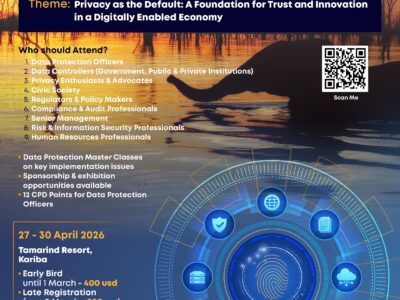Cyber threats grow more sophisticated by the day, businesses are no longer judged solely by their ability to fend off attacks but are also evaluated on how ethically and sustainably they manage cybersecurity.
In a presentation by one Takudzwa Antonio a cyber security enthusiast at the 2025 Cyber Fraud Summit, he highlighted a critical shift that is how Environmental, Social, and Governance (ESG) principles are now central to cybersecurity strategies.
By Gamuchirai Mapako
The presentation touched on how investors and stakeholders are increasingly prioritizing ESG-aligned cybersecurity frameworks, making it a competitive differentiator for businesses, ESG-driven cybersecurity is gaining traction.
Historically, cybersecurity was seen as a technical necessity, firewalls, encryption, and threat detection tools were the focus. However, as digital risks escalate, stakeholders now demand transparency, ethical governance, and sustainable practices in how companies defend their systems.
Several entities investing into businesses are scrutinizing energy-hungry data centers and e-waste from obsolete security hardware contribute to carbon footprints, poor data privacy protections disproportionately harm vulnerable populations and weak cybersecurity policies expose companies to legal liabilities and reputational damage.
According to research companies that align cybersecurity with ESG principles attract more investment, reduce regulatory risks, and build stronger brand trust.
Consumers and partners increasingly favor companies that demonstrate ethical data handling and sustainable security practices.
A great example is Apple’s strict privacy policies which have bolstered its reputation as a leader in ethical tech and Microsoft’s governance framework integrates cybersecurity at the executive level, ensuring compliance and accountability.
Companies that neglect ESG in cybersecurity risk losing customer trust and investor confidence especially after high-profile breaches.
With laws like GDPR and CCPA imposing heavy fines for data mishandling, businesses must adopt proactive, governance-led security strategies. Antonio’s presentation emphasized the need for regular cybersecurity audits to ensure compliance, board-level accountability for security policies and transparency in breach disclosures to maintain stakeholder trust.
The environmental cost of cybersecurity is often overlooked. Data centers powering security operations consume massive energy, while frequent hardware upgrades generate e-waste. As a solution big companies like Google have introduced green data centers, energy-efficient encryption and storage solutions and sustainable hardware recycling programs.
By reducing their environmental footprint, companies cut costs and appeal to eco-conscious investors.
Implementing ESG-driven cybersecurity isn’t without hurdles. Regulatory gaps in global cybersecurity standards create compliance complexities as policies vary by region.
The integration of ESG into cybersecurity marks a paradigm shift. Companies that embrace sustainable, ethical, and governance-focused security practices will not only mitigate risks but also gain investor trust, ensure compliance, and lead the market.
As Antonio aptly summarized:
“ESG is not just a checklist but the foundation of a resilient and responsible digital world.”














Comments